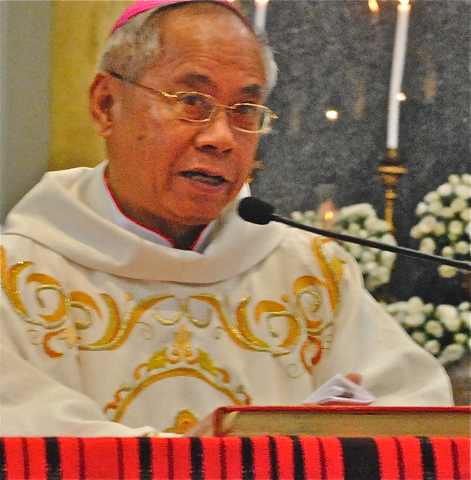
Archbishop Orlando Quevedo of Cotabato, the Philippines (N.J. Viehland)
Archbishop Orlando Quevedo of Cotabato, the Philippines, until recently secretary general of the Federation of Asian Bishops' Conferences (FABC), expressed confidence in Manila Archbishop Luis Antonio Tagle's ability, personality and integrity to represent the thinking and orientation of the most authoritative body through which bishops in Asia have spoken collectively.
"Archbishop Chito [Tagle] keeps the concerns of the church in Asia close to his heart. Now as cardinal, he would surely be a clear and articulate Asian voice in Rome," Quevedo told NCR.
Pope Benedict XVI named Tagle, 55, among six new cardinals who will be officially created at the Nov. 24 consistory in Rome. He was attending the Synod on New Evangelization, where he served on the Committee for the Message, when his elevation to cardinal was announced.
Tagle leads the Office of Theological Concerns of the FABC, a voluntary association of bishops' conferences in Asia formed to further initiatives and directives of the Second Vatican Council (1962-65) with regard to the local churches. The FABC's statutes, approved by the Vatican on Nov. 16, 1972, created the organization to "foster among its members solidarity and co-responsibility for the welfare of church and society in Asia, and to promote and defend whatever is for the greater good."
It has 19 member episcopal conferences for 18 territories, including Kazakhstan in Central Asia. Associate members from nine places where there are no bishops' conferences have also joined the federation, among them churches in four other Central Asian countries and in Novosibirsk, Russia.
Quevedo, 73, completed last December his second term as secretary general, and now serves as consultant to the federation’s Office of Human Development. He explained that the church in Asia has a "unique" contribution to the renewal of the universal church. The FABC vision is that of "a church that humbly proclaims Jesus, as the Lord and Savior of the world, by 'telling his story' through a mode of triple dialogue with the rich cultures of Asia, with its ancient religious traditions, and with the poor of Asia."
Quevedo added that churches in Asia have aspired to be "a church of the poor, a participatory church, a humble herald of Jesus the Lord, a servant-companion of the peoples of Asia in the common journey toward the reign of God." This is the vision that has guided FABC reflection and activities through the past four decades in the continent of diverse cultures and religious traditions, where less than 3 percent of populations in most countries are Christian, and most people live in poverty.
"Together with other Asian cardinals, Archbishop Chito will surely share with the College of Cardinals that Asian vision of a humble and poor church and its mission of new evangelization," Quevedo said.
He hinges his trust on "outstanding qualities of mind and heart" that he has observed in Tagle's service with the Catholic Bishops' Conference of the Philippines and the FABC, and in other interactions with him. Quevedo specified Tagle's "qualities of a servant-leader, such as listening not only to clergy and religious, but also to people in the grass roots, consulting, delegating, empowering" people.
The Oblate archbishop pointed out that these characteristics require humility and person-orientation rather than assertion of power and work-orientation. "These qualities are necessary for a participatory church and a church of dialogue," which Catholics in the Philippines and the FABC have identified as dimensions of their vision of a "new way of being church" Realizing this vision of church depends largely on leaders, particularly bishops, Quevedo stressed.
According to Quevedo, archbishops and cardinals already noticed these qualities in Tagle when he, as a priest, served as theologian expert during various synods.
As a member of the Pontifical Council for Justice and Peace from 1990 to 1994, Quevedo experienced the "friendship" between Tagle and Pope Benedict XVI. Once, then Cardinal Joseph Ratzinger asked Quevedo "how our 'baby theologian' was doing," the Filipino prelate recalled. " 'Father' Chito was then a member of the International Theological Commission, which was under Cardinal Ratzinger, and had just been appointed bishop of Imus."
He called the friendship "a special grace," adding, "I know Archbishop Chito well enough that despite friendships, he will opt for what he personally believes is right." He expects Tagle will be given heavier responsibilities because he is known for his sharp mind and sensitivity to others.
Quevedo also remembered engaging Tagle in writing the theological section of the final statement of the 1995 FABC plenary assembly on the theme “Christian Discipleship in Asia Today: Service to Life.” "A highlight of those early years was his appointment as theological expert to help with the special assembly of the Synod of Bishops for Asia" in 1998, Quevedo said. Tagle reportedly struggled to make sure that the thinking of Asian bishops would be emphasized.
Quevedo describes speculations about Tagle's chances to become pope as "the dreams of Filipino Catholics filled with enthusiasm and joy." Still, he acknowledges, "The Holy Spirit who guides the church blows where it will -- mysteriously -- in all corners of the world."




